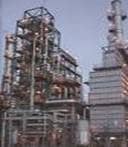Introduction
Over the years with the great expansion of scientific knowledge, the basis of applying science particularly chemistry to develop technology has increased tremendously. This has lead to the development of the profession of chemical Engineering. Chemical engineering is the branch of engineering that deals with the application of physical science (e.g. chemistry and physics),They also lead to research and development by pioneering valuable new materials and techniques. Indeed, chemical engineers are responsible for the availability of the modern high-quality materials that are essential for running an industrial economy. Chemical engineering is concerned with the designing, supervision, construction, installation and operation of plants and equipments for manufacturing chemical products and developing new methods of production. Thus it combines the knowledge of Chemistry and Engineering for the production of chemicals and related by-products.



The application of chemical technology covers a wide range of fields like mineral based industries, petrochemical plants, pharmaceuticals, synthetic fibres, petroleum refining plants etc.Similarly a chemical engineer has to combine the work of a chemists, industrial engineers, materials engineers as well as electrical engineers. Chemical engineers are responsible for the availability of modern high-quality materials that are essential for running an industrial economy. In future the industrial expansion will lead to a great of chemical engineers as they work to create synthetic replacements for those natural materials and resources that are in short supply, shaping the hydrogen economy, and creating pollution free iron production.
CAREER
Chemical engineers play a key role in industries, mostly in the manufacturing field. Their work area varies from petroleum and petrochemicals to food materials, specialty chemicals, plastics, power production, environmental control, waste management and biotechnology. Wide employment opportunities await chemical engineers both in the public sector as well as the private sector. They can seek jobs in areas such as
• food processing
• coal preparation
• explosives manufacturing
• operations or manufacturing
• research and development
• design and construction
• finance and teaching
• mineral processing
In process industries they could work in positions such as a• supervisor or manager
• technical specialist
• project manager
• project engineers
They may also pursue a management degree after B.Tech and take on marketing jobs. Candidates with an additional management degree are sought by private industries. Among the manufacturing industries, pharmaceuticals provide the best opportunities for chemical engineers. In the government sector, chemical engineers are employed to solve environmental problems such as waste and water treatment, environmental regulations and recycling; on energy sector such as energy conservation and research on alternate energy sources and health-related research projects, defense establishments and atomic power plants. They are also employed in service industries such as scientific research and development services, particularly in energy and the developing fields of biotechnology and nanotechnology.
Other work areas of chemical engineers include chemical process industries such as fertilizer industry, including pesticides and herbicides, caustic soda, glass and specialty chemicals, dyes and dyestuff, paint, lubricants, steel and aluminum production. They are also employed in a variety of manufacturing industries other than chemical manufacturing, such as those producing electronics, photographic equipment, clothing, pulp and paper and even in the development of aircrafts.
FAMOUS AND AWARD WINNERS IN THE FIELD OF CHEMICAL ENGINEERING
Japanese engineer Koichi Tanaka won the 2002 Nobel Prize in Chemistry for his work identifying and analyzing large molecules. He was the youngest winner of the chemistry award since 1934.
Mario J. Molina: Born on March 19, 1943, son of Roberto Molina Pasquel, a lawyer and diplomat and Leonor Henriquez de Molina, Mario was one of the pioneering precursors to the discovery of the Antarctic ozone hole. He graduated in chemical engineering, earned a master's from the Albert Ludwigs University of Freiburg, West Germany and a doctoral degree in Chemistry from the University of California. His research in dangers to the ozone layer led to the moves towards the worldwide ban on the CFC-emitting aerosol cans and refrigerators. For his contribution to science, he was honored the Nobel Prize in Chemistry. Today he is a member of a number of science organizations and 18 honorary degrees have been conferred on him. Mario Molina is one of those famous Mexicans who revolutionized the studies on the Earth's ozone layer.

Horoscope - Career for Zodiac Signs
So if you consider yourself to be a sharp, well-rounded person with the drive to take up CHEMICAL ENGINEERING then check if these sun signs are your's,which is in favour for this career
 Aries
Aries
 Libra
Libra
 Scorpio
Scorpio
 Capricorn
Capricorn
 Aquarius
Aquarius
 Pisces
Pisces
Eligibility : Click here for more information
Institutes : Some of the prominent institutions offering courses in Chemical Engineering can be had from the following links.. Click here for more information